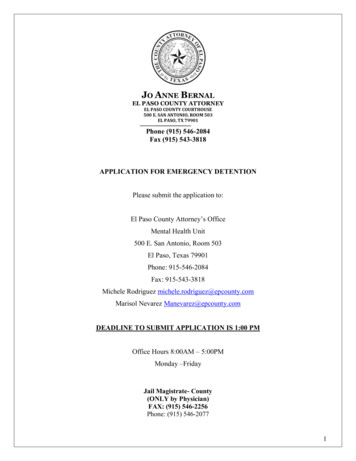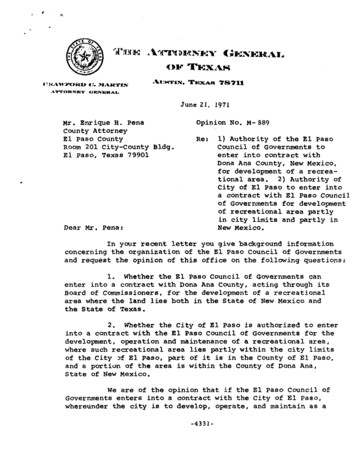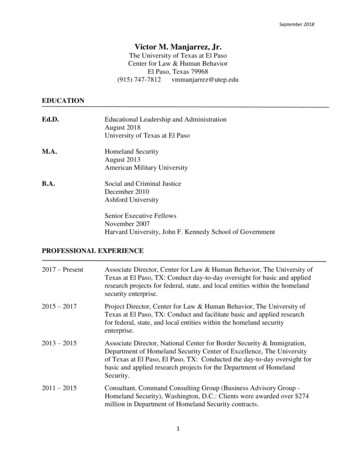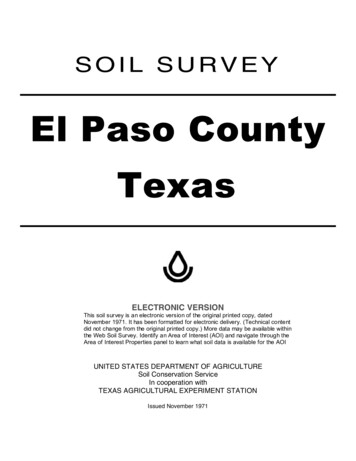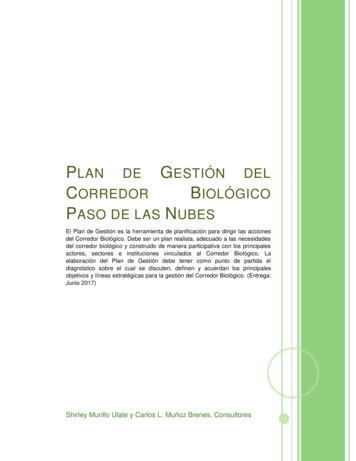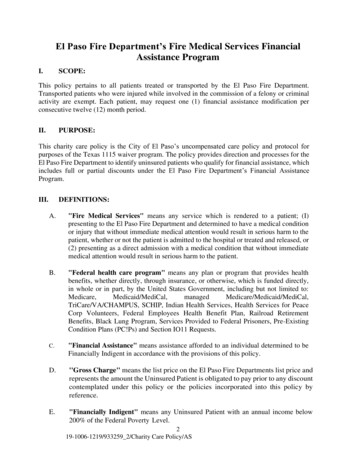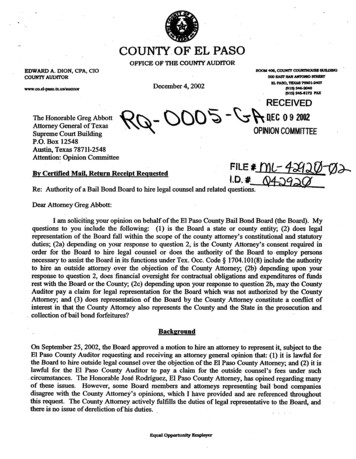
Transcription
I-.-COUlfTY.OF EL PASOOFFICE OF THE COUNTY AUDITOREDWARD A. DION, CPA, CIOCOUNTYAUDITORDecember 4,2002www.co.cl-paso.bt.uSlpuoltor. RECEIVEDThe Honorable Greg AbbottAttorney General of TexasSupreme Court BuildingP.O. Box 12548Austin, Texas 78711-2548Attention: Oninion Committee(&Q.Qobs.-&\:QEC0 9 2002OPINIONCOMMITTEEBv Certified Mail, Return Receipt Requestedlxx #Re: Authority of a Bail Bond Board to hire legal counsel and related questions.Dear Attorney Greg Abbott:I am soliciting your opinion on behalf of the El Paso County Bail Bond Board (the Board). Myquestions to you include the following: (1) is the Board a state or county entity; (2) does legalrepresentation of the Board fall within the scope of the county attorney’s constitutional and statutoryduties; (2a) depending on your response to question 2; is the County Attorney’s consent required inorder for the Board to hire legal counsel or does the authority of the Board to employ personsnecessaryto assist the Board in its functions under Tex. Oct. Code 1704.101(8) include the authorityto hire an outside attorney ‘over the objection of the County Attorney; (2b) depending upon yourresponse to question 2, does financial oversight for contractual obligations and expenditures of fundsrest with the Board or the County; (2 ) depending upon your response to question 2b, may the CountyAuditor pay a claim for legal representation for the Board which was not authorized by the CountyAttorney; and (3) does representation of the Board by the County Attorney constitute a conflict ofinterest in that the County Attorney also represents the County and the State in the prosecution and. collection of bail bond forfeitures?BackeronndOn September 25,2002, the Board approved a motion to hire an attorney to represent it, subject to theEl Paso County Auditor requesting and receiving an attorney general opinion that: (1) it is lawful forthe Board to hire outside legal counsel over the objection of the El Paso County Attorney; and (2) it islawful for the El Paso County Auditor to pay a claim for the outside counsel’s fees under suchcircumstances. The Honorable Jose Rodriguez, El Paso County Attorney, has opined regarding manyof these issues. However, some Board menrbers and attorneys representing bail bond companiesdisagree with, the County Attorney’s opinions, which I have provided and are referenced throughoutthis request. The County Attorney actively fulfills the duties of legal representative to the Board, andthere is no issue of dereliction of his duties. ,. .4.
,’.rThe Honorable Greg AbbottDecember 4,2002Page 21. Is the Board a state or county entity?It is contended by some members of the Board that the Board is not a “county entity,” and thereforeneed not seek legal advice from the County Attorney. Based on the El Paso County Attorney’sanalysis,Garcia-Marroquin v. Nueces Countv Bail Bond Board, 1 S.W.3d 366,372 (Tex. App.-Corpus Christi1999, no pet.), cited in County Attorney Opinion 01-l 12, the following authorities expressly hold thatthe Bail Bond Board is a county entity: Dallas Countv Bail Bond Board v. Mason, 773 S.W.2d 586,587 (Tex. App.- Dallas 1989, no writ) (holding that the Bail Bond Board is a “county board” and a“legal entity through which the county performs its governmental function”); Dallas Countv Bail BondBoard v. Stein, 771 S.W.2d 577, 579 (Tex. App.- Dallas 1989, writ denied) (holding that the BailBond Board is “a governmental agent of the county for purposes of regulating the bail bondindustry.“). The County Attorney therefore concluded, the Bail Bond Board is a county entity for thereasons explained in Opinion 01-l 122. Does legal representation of the Board fali within the scope of the county attorney’s duties?There is a dispute over whether the County Attorney is the exclusive attorney for the Board. TheCounty Attorney addressed this issue in Opinion No. 01-l 12 and stated the following: “Regarding theduties of County and District Attorneys, Article V, Section 21 of the Texas Constitution provides asfollows: A County Attorney, for counties in which there is not a resident Criminal District Attorney,shall be elected by the qualified voters of each county, who shall be commissioned by the Governor,and hold his office for the term of four years. In case of vacancy the Commissioners Court of thecounty shall have the power to appoint a County Attorney until the next general election. The CountyAttorneys shall represent the State in all cases in the District and inferior courts in their respectivecounties; but ifany county shall be included in a district in which there shall be a Distkt Attorney, therespective duties of District Attorneys and County Attorneys shall in such counties be regulated by theLegiklature. The Legislature may provide for the election of District Attorneys in such districts, as maybe deemed necessary, and make provision for the compensation of District Attorneys and CountyAttorneys. District Attorneys shall hold office for a term of four years, and until their successors havequalified.Tex. Const. art. V, 5 21 (emphasis added). The Legislature has provided a District Attorney for El PasoCounty. Tex. Gov ‘t Code Ann. § 43.120(a) (V emon Supp. 2001) (“The voters of Culberson, Hudspeth,and El Paso Counties elect a district attorney for the 34* Judicial District.“) Accordingly, theLegislature has specified the scope of the County Attorney’s courtroom duties, which are as follows:
The Honorable Greg AbbottDecember 4,2002Page 30aIt is the primary duty of the county attorney in El Paso County or his assistantsto represent the state, El Paso County, and the officials of ElPaso County in all civilmatters pending before the courts of El Paso County and any other courts in which thestate, the county, or the officials of the county have matters pending.0The county attorney has the powers, duties, and privileges relating to theprosecution of misdemeanors that relate to health and environmental matters and thatrelate to the prosecution of misdemeanors under Section 32.42, Penal Code.0CAt the request of the district attorney, the county attorney may assist the districtattorney in criminal cases in El Paso County.(d) The county attorney in El Paso County performs the duty of collecting andprocessing checks and similar sight orders as provided under Article 102.007, Code ofCriminal Procedure, and prosecutes misdemeanors where a check or sight order is theinstrument by which the misdemeanor is committed.&l. 5 45. I71. Under Section 45.171 (a), the El Paso County Attorney is expresslyassigned the duty of handling all civil matters involving the county and county officialspending in court.With respect to matters outside the courtroom, Texas Government Code Section 41.007provides as follows:A district or county attorney, on request, shall give to a county or precinct official of hisdistrict or county a written opinion or written advice relating to the official duties of thatofficial.&l. 8 41.007 (Vernon 1988). Although the phrase “on request” might suggest it is within a countyofficial’s discretion whether to seek legal advice from a County or District Attorney, the AttorneyGeneral has clarified that “[t]he proviso ‘on request’ serves only to protect district and countyattorneys from being considered derelict in their duty to advise if public officials fail or refuse torequest assistance.” Op. Tex. Att’y Gen. No. JM-128 I,7 (1990). Further, refusal by a county official toseek legal advice from the County or District Attorney is improper: “[Tlhe commissioners court maynot suspend a portion of the duties required by law to be perfomred by an elected legal officer bysimply refusing to request advice the commissioners court deems necessary.” Id. Thus, Section 41.007authorizes a County or District Attorney to provide legal advice to county officials whether theyrequest it or not.
The Honorable Greg AbbottDecember 4,2002Page 4The effect of these three authorities, Article V, Section 21 of the Texas Constitution and Sections45.171(a) and 41.007 of the Texas Government Code, taken together, is “to compel the variousofficials of [El Paso] County to obtain representation and advice from the [El Paso] County Attorney,and him alone,” except where otherwise expressly provided by law. Id. at 5-6. The statutory duty of aCounty Attorney to advise county officials is “all-inclusive,” and there are “no county matter[s] whichwould not fall within the contemplation or definition of such duty.” Id. at 6. See also Jones v. Veltman,171 S.W. 287,290 (Tex. Civ. App.- San Antonio 1914, writ ref d) (“[ljt was [the County Attorney’s]duty to advise [the Commissioners Court] in regard to all county matters. There could be no countymatters about which advice was required that was ‘not contemplated or covered’ by his officials dutiesas County Attorney.“).Thus, because the BailBond Board is a county entity, Garcia-Marroquin v. Nueces County Bail BondBoard, 1 S.W.3d 366,372 (Tex. App.-Corpus Christi 1999, no pet.), representation of theBoard, both with regard to pending litigation and matters outside the courtroom, falls within the scopeof the County Attorney’s duties.”2(a). Is the County Attorney’s consent required in order for the Board to hire legal counsel ordoes the authority of the Board to “employ persons necessary to assist the Board in its functions”under Tex. Oct. Code 0 1704.101(8) include authority to hire an outside attorney over theobjection of the County Attorney?It is contended by some members of the Board that, regardless of whether the Board is a county entity,the County Attorney’s consent to the hiring of outside counsel is unnecessary. They rely upon theauthority of Tex. Oct. Code 1704.101(8), which authorizes the Board to employ persons necessary toassist the Board in its functions. The County Attorney provides regular legal services to the Board,and there are no unmet legal needs. A bail bond administrator has been hired in reliance upon thisstatute.Opinion 01-l 12 cites authorities holding that county entities cannot hire outside legal counsel withoutthe County Attorney’s consent such as Op. Tex. Att’y Gen. No. JM-1281, 7 (1990) wherein it states,“The commissioners court may not suspend a portion of the duties required by law to be performed byan elected legal officer by simply refusing to request advice the commissioners court deemsnecessary”. The County Attorney’s contention is that because representation of the Board, both withregard to pending litigation and matters outside the courtroom, falls within the scope of the CountyAttorney’s duties, neither the Commissioners Court nor the Board may hire outside legal counsel toperform this function without the County Attorney’s consent.
The Honorable Greg AbbottDecember 4,2002Page 52(b). Who is responsible for the fmancial oversight of the Board’s expenditures?Chapter 1704 of the Occupation Code provides that the Board shall deposit fees collected under thischapter in the general fund of the county. Tex. Oct. Code 3 1704.101 (2). The board charges a fee offive hundred dollars ( 500.00) for each application filed. Tex. Oct. Code 0 1704.154 (4)(D). Section,lO3 of the Act covers disbursements from the County Fund. The collected fees may be used only toadminister and enforce this chapter.The County Auditor is directed by Tex. Lot. Gov’t Code Ann. 0 112.06 to “see to the strictenforcement of the law governing county finances.” The funds are deposited in the County’s generalfund. Nonetheless, the board asserts that it, and not the County Auditor, is ultimately responsible forapproving the expenditure of collected fees. By contrast, it is the position of the County Auditor thathe is ultimately responsible for verifying that the funds are applied to a proper purpose.2(c). May the County Auditor pay a claim for outside legal representation approved by theBoard but not authorized by the County Attorney?Assuming the Board without concurrence of the County Attorney hires an attorney, payment of thisattorney would not be in strict compliance with the law and would therefore be denied uponpresentment for payment to the County Auditor. The County Auditor is directed by Tex. Lot. Gov’tCode Ann. 112.006 to “see to the strict enforcement of the law governing county finances.“. Tex.Lot. Gov’t Code Ann. § 113.064 further states a claim “may not be allowed or paid until it has beenexamined and approved by the auditor.“. 113.065 provides that “the county auditor may not audit orapprove a claim unless the claim was incurred as provided by law.“. Therefore, it is the CountyAuditor’s duty to withhold approval of a claim “unless the claim was incurred as provided by law.“.3. Does representation of the Board by the County Attorney constitute a conflict of interest inthat the County Attorney also represents the State and the County in the prosecution of bailbond forfeitures?Some members of the Board assert that the County Attorney has a conflict of interest which prohibitshim from both representing the Board and prosecuting bail bond forfeiture judgments. The CountyAttorney asserts that there is no conflict because the dual duties of advising the Board and prosecutingbail bond forfeitures are aligned, rather than materially and directly adverse to one another. TheCounty Attorney further asserts that, even if a conflict exists, it has been waived by the legislature.The issue is addressed at length in Opinion 01-152, issued by the County Attorney on August 22’2001wherein he states:“The County Attorney’s duty to advise the Bail Bond Board arises under Texas Government CodeSection 41.007, which provides as follows:
The Honorable Greg AbbottDecember 4’2002Page 6A district or county attorney, on request, shall give to a county or precinct official of his district orcounty a written opinion or written advice relating to the official duties of that official.Tex. Gov ‘t Code Ann. § 41.007 (Vernon 1988). As discussed in El Paso County Attorney Opinion No.01-l 12, when county entities such as the Bail Bond Board seek legal advice, they are required to seekit from the County Attorney, and the County Attorney is in turn required to provide such advice.Further, the County Attorney’s duty to prosecute bail bond forfeitures arises under Article 2.02 of theTexas Code of Criminal Procedure, which provides as follows:The county attorney shall attend the terms of court in his county below the grade of district court, andshall represent the State in all criminal cases under examination or prosecution in said county; and inthe absence of the district attorney he shall represent the State alone and, when requested, shall aid thedistrict attorney in the prosecution of any case in behalf of the State in the district court. He shahrepresent the State in cases he has prosecuted which are appealed.Tex. Code Crirn. Proc. Ann. art. 2.02 Vernon Supp. 2001) (emphasis added). See also Tex. Gov ‘t CodeAnn. 45. I7 l(c) (Vernon Supp. 2001) (“At the request of the district attorney, the county attorneymay assist the district attorney in criminal cases in El Paso County.“). Pursuant to these provisions, theDistrict Attorney has requested that the County Attorney handle all bail bond forfeitures in El PasoCounty. See AfZdavit of Jaime Esparza dated November 12, 1993 (Attachment “A,‘), and Letter fromJaime Esparza dated July 22’1996 (Attachment “B”).The Texas Supreme Court has held that when the statutory duties of a government attorney create aconflict of interest, the statutes creating such duties take precedence over the rules regarding conflicts.Public Utilitv Comm’n of Texas v. Cofer, 754 S.W.2d 121,125 (Tex. 1988) (holding that the AttorneyGeneral could not be compelled to withdraw from his statutory duty to represent two state agencieseven though the agencies were directly opposed in litigation). The Court reasoned that “[i]f ‘dualrepresentation’ does in fact create a conflict of interest, it is a problem of the Legislature’s creation,and one that the Legislature must resolve.” &&at 126. Thus, even if the County Attorney’s dual dutiesof advising the Bail Bond Board and prosecuting bail bond forfeitures did involve a conflict of interest,the County Attorney would not be precluded from performing either statutory duty. However, no suchconflict exists.The general rule regarding conflicts of interest is Rule 1.06 of the Texas Disciplinary Rules ofProfessional Conduct, which provides in relevant part as follows:0aA lawyer shall not represent opposing parties to the same litigation.In other situations and except to the extent permitted by paragraph (c), a lawyershall not represent a person if the representation of that person:
The Honorable Greg AbbottDecember 4,2002Page 7involves a substantially related matter in which that person’s interests arematerially and directly adverse to the interests of another client of thelawyer or the lawyer’s firm; or(2)reasonably appears to be or become adversely limited by the lawyer’s orlaw firm’s responsibilities to another client or to a third person or by thelawyer’s or law firm’s own interests.Tex. Disciplinary R. ProJ Conduct I. 06 (1989), reprinted in Tex. Gov ‘t Code Ann., tit. 2, subtit. G app.(Vernon 1998) (State Bar Rules art. x 9). Thus, the dual duties of advising the Bail Bond Board andprosecuting bail bond forfeitures give rise to a conflict of interest only if these duties involvematerially and directly adverse interests or result in adversely limited representation. No such resultfollows from these duties.Chapter 22 of the Taas Code of Criminal Procedure governs bail bond forfeitures. Forfeitureproceedings involve three main steps: declaration of forfeiture, trial, and fIna1 judgment. Article 22.02sets forth the circumstances under which a declaration of forfeiture must be issued by the court inwhich a criminal case is pending:Bail bonds and personal bonds are forfeited in the following manner: The name of thedefendant shall be called distinctly at the courthouse door, and if the defendant does not appearwithin a reasonable time after such call is made, judgment shall be entered that the State ofTexas recover of the defendant the amount of money in which he is bound, and of his sureties,if any, the amount of money in which they are respectively bound, which judgment shall statethat the same will be made final, unless good cause be shown why the defendant did notappear.Ta. Code Grim. Proc. Ann. art. 22.02 (Vernon 1989).Further, Article 22.125 sets forth guidelines for trial in a forfeiture case:After a judicial declaration of forfeiture is entered, the court may proceed with the trial requiredby Article 22.14 of this code. The court may exonerate the defendant and his sureties, if any,from liability on the forfeiture, remit the amount of the forfeiture, or set aside the forfeitureonly as expressly provided by this chapter. The court may approve any proposed settlement ofthe liability on the forfeiture that is agreed to by the state and by the defendant or thedefendant’s sureties, if any.
.’The I-Ionorable Greg AbbottDecember 4,2002Page 8Id. art. 22.125 (Vernon Supp. 2001).Finally, Article 22.14 sets forth requirements relating to issuance of a final judgment:When, upon a trial of the issues presented, no sufficient cause is shown for the failure of theprincipal to appear, the judgment shall be made final against him and his sureties, if any, for theamount in which they are respectively bound; and the same shall be collected by execution asin civil actions. Separate executions shall issue against each party for the amount adjudgedagainst him. The costs shall be equally divided between the sureties, if there by more than one.Id. art. 22.14 (Vernon 1989).Thus, the State’s interest in forfeiture litigation is to obtain favorable judgments and to collect on suchjudgments.In contrast, the Bail Bond Board plays no role and therefore has no interest in the adjudication offorfeiture cases, either as a party or a tribunal. It does, however, have ministerial duties relating to thecollection of forfeiture judgments under Section 1704.204 of the Texas Occupations Code (“SectionI 704.204 “) and Article 103.004 of the Texas Code of Criminal Procedure (“Article 103.004 “).Section 1704.204 provides as follows:(a) A license holder shall pay a final judgment on a forfeiture of a bail bond executedby the license holder not later than the 30thday after the date of the final judgment.(b) If a license holder fails to pay a final judgment as required by Subsection (a), thejudgment shall be paid from the security deposited or executed by the license holderunder Section 1704.160.Tex. Oct. Code Ann. f 1704.204 (Vernon Supp. 2001).Further, Article 103.004 provides in relevant part as follows:(a) Except as provided by Subsections (b) and (c), an officer who collectsrecognizances, bail bonds, fines, forfeitures, judgments, jury fees, and otherobligations recovered in the name of the state under any provision of this title shalldeposit the money in the county treasury not later than the next regular business dayafter the date that the money is collected. If it is not possible for the officer todeposit the money in the county treasury by that date, the officer shall deposit themoney in the county treasury as soon as possible, but not later than the third regularbusiness day after the date that the money is collected.
The Honorable Greg AbbottDecember 4,2002Page 9(b) The commissioners court of a county may authorize an officer who is required todeposit money under Subsection (a) to deposit the money in the county treasury notlater than the seventh regular business day after the date that the money is collected.Tex. Code Cnm. Proc. Ann. art. 103.004 (Vernon Supp. 2001).Foreclosing on secured property and depositing the proceeds in the appropriate account are actionstaken by the Bail Bond Board on behalf of the State and the County. Because the Board’s duties withrespect to forfeiture litigation are thus aligned with the interests of the State and the County, rather thanmaterially and directly adverse to them, and because representation of none of these governmentalbodies by the County Attorney is in any way limited by representation of the others, suchrepresentation presents no conflict of interest.”The County Attorney has therefore concluded “Because both advising the Bail Bond Board andprosecuting bail bond forfeitures fall within the scope of the County Attorney’s statutory duties, theCounty Attorney is permitted to perform both duties regardless of whether there is a conflict ofinterest. However, no such conflict in fact exists.”ConclusionThe County Attorney has concluded that because the Bail Bond Board is a county entity,representation of the Board, both with regard to pending litigation and matters outside the courtroom,falls within the scope of the County Attorney’s duties. Furthermore, the County Attorney concludesthat only with his consent, may outside legal counsel be hired to represent the Board, whether suchcounsel is hired by the Commissioners Court to assist the County Attorney in the performance ofstatutory duties, or by the Bail Bond Board under Section 1704.101 of the Texas Occupations Code.The County Attorney further concludes that even though under Section 1704.101(8) of the TemsOccupations Code, a Bail Bond Board may “employ persons necessary to assist in board functions,Tex. Oct. Code Ann. 1704. IO1 (Vernon Supp. 2001, no legal authority has construed this provision topermit the hiring of outside legal counsel to represent the Board. Assuming the Board hires anattorney without concurrence of the County Attorney, payment of this attorney would not be in strictcompliance with the law Tex. Lot. Gov’t Code Ann. 113.065 which provides that “the county auditormay not audit or approve a claim unless the claim was incurred as provided by law.“. Therefore, it isthe County Auditor’s duty to withhold approval of a claim “unless the claim was incurred as providedby law.“. Regarding the contention that there is a conflict of interest between the Board and El Paso.County and the County Attorney should not represent both entities, the County Attorney concludes“because both advising the Bail Bond Board and prosecuting bail bond forfeitures fall within the scopeof the County Attorney’s statutory duties, the County Attorney is permitted to perform both dutiesregardless of whether there is a conflict of interest. However, no such conflict in fact exists.”
.\.t: ::The Honorable Greg AbbottDecember 4,2002Page 10I respectfully request a formalconclusions.from YOW office regarding the correctness of theseEdward A.DionEl Paso County AuditorEAD:yaEnclosurescc:Mr. Mike Navarro, Bail Bond Board Administration/Director B.I.T. (SO)The Honorable Jo& Rodr@uez, County AttorneyMix. Lee Shapleigh, Assistant County Attorney
The Honorable Greg Abbott December 4,2002 Page 4 The effect of these three authorities, Article V, Section 21 of the Texas Constitution and Sections 45.171(a) and 41.007 of the Texas Government Code, taken together, is "to compel the various officials of [El Paso] County to obtain representation and advice from the [El Paso] County Attorney,
